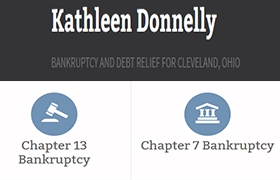Cleveland Collection Lawyer, Ohio, page 3
Sponsored Law Firm
-
 x
x

Click For More Info:
-
Law Office of Kathleen Donnelly
526 Superior Ave #1030 Cleveland, OH 44114» view mapChapter 7, Chapter 13, Free Evaluations Need Debt Relief? Contact Me Today
There is hope for debt relief. At the Cleveland, Ohio, law office of Kathleen Donnelly, we help people like you to escape from under mountains of debt.
800-413-4100
Melissa Ann Hager
Litigation, International Other, Collection, Bankruptcy & Debt
Status: In Good Standing Licensed: 24 Years
Gregory Gordon Guice
Litigation, Insurance, Collection, Personal Injury
Status: In Good Standing Licensed: 21 Years
Drew Thomas Parobek
Corporate, Banking & Finance, Collection, Bankruptcy
Status: In Good Standing Licensed: 40 Years
Carl Joseph Dyczek
Real Estate, Corporate, Banking & Finance, Collection
Status: In Good Standing Licensed: 44 Years
Patrick Thomas Lewis
Litigation, Employee Rights, Collection, Products Liability
Status: In Good Standing Licensed: 20 Years
Michael Andrew Vanniel
Corporate, Banking & Finance, Collection, Bankruptcy
Status: In Good Standing Licensed: 23 Years

 Kathleen Donnelly Cleveland, Ohio
Kathleen Donnelly Cleveland, Ohio About UsKathleen Donnelly
About UsKathleen Donnelly Contact UsCall or Email Right Now
Contact UsCall or Email Right Now
